America on edge: Berkeley scholars’ early election thoughts
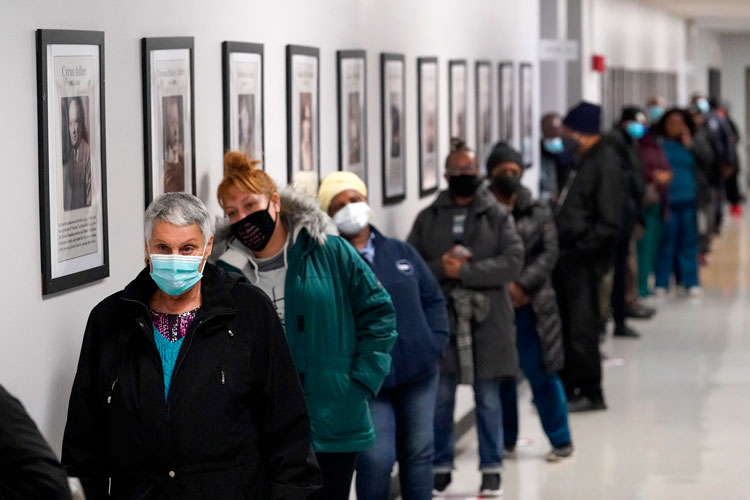
UC Berkeley scholars awoke Wednesday, Nov. 4 to signs of a deeply divided U.S. electorate, and no blue wave on the horizon. Despite a surge in early voting, ballots were still being counted in several battleground states. As of noon that day, the race between President Donald Trump and his Democratic challenger Joe Biden remained too close to call.
So what now? Below, Berkeley experts across various academic disciplines offer perspectives on where we as a country find ourselves in the days after the election. They also give their thoughts about the role, good and bad, of such wedge issues as immigration, racial justice, law and order, the environment and the handling of the coronavirus pandemic, in this historic presidential vote.
Steven Weber, political scientist and professor in the School of Information

“It’s clear that core divisions splitting America down the middle in 2020 cannot, this time, be shoveled off for blame on foreign interference, social media or some third party or exogenous shock. There was no ‘October Surprise,’ no evidence of systemic election interference, no significant cybersecurity lapses that we know of. The social media platform firms’ new policies on content promotion and political advertising weren’t perfect, but they were better than in 2016 and appear to have been good enough to limit misinformation contagion at a scale large enough to matter. I think this election will prove to reflect a fundamental condition of America itself, not interventions by Vladimir Putin or the pathologies of Facebook and Twitter. There’s an upside to that assessment: In 2020, the American polity has to take responsibility for the extraordinarily deep divisions that haunt this country. Whoever ultimately wins the White House, I hope going forward that both parties really own that observation and start, from scratch, to build policies and strategies that can offer something more across what, for the moment, looks like an impermeable divide. It’s our divide, not someone else’s.”
Saru Jayaraman, adjunct professor in the Goldman School of Public Policy

“While it is deeply painful that the election results did not demonstrate an American repudiation of hate, bigotry, white supremacy and patriarchy, we can find some solace that we will most likely end up with a president who has been pushed to embrace progressive values and policies by many years of impressive social movement organizing by thousands of grassroots leaders over the last four years, in particular. It might be counterintuitive, but the extremely divided state of the nation does not call for a more centrist policy platform that pleases no one — it calls for a bold, progressive vision that takes us forward, not backward, and inspires working people on both sides of the aisle to finally come together. Unity does not require centrism. It requires change that will address the needs of millions of working people — left, right and center — struggling to put food on their tables.”
Irene Bloemraad, professor of sociology and director of the Berkeley Interdisciplinary Migration Initiative

“What was the role of immigration policy and immigrants in this deeply divided election? The wall that Trump promised Mexico would pay for hasn’t been built. But over the last four years, the Trump administration has engaged in a full-court press to narrow or shut down almost all aspects of the U.S. immigration system. This includes dropping refugee admissions to less than 15% of 2016 numbers, restricting asylum, separating children from parents, seeking to end DACA and TPS and setting up a new office to investigate stripping citizenship from naturalized Americans. Given this, I’ve been surprised that the 2020 campaign was so silent on a signature issue of Trump’s 2016 run for office. Some in Trump’s base clearly continue to support harsh immigrant restrictions. Was the silence on immigration a deliberate attempt to court immigrants and their adult children in places like Florida? Conversely, voters’ move to voting Democratic in Maricopa County, Arizona — the place where Sheriff Joe Arpiao long terrorized immigrants – might reflect the hard work of Latinx residents and immigrant allies to mobilize the vote and challenge public officials’ immigrant bashing. Will California’s shift from Pete Wilson’s 1990s Prop 187 agenda to an overwhelming ‘blue’ bulwark today be repeated in other states?”
Ula Taylor, chair and professor of African American studies and African Diasporas studies

“Let me be blunt. The Electoral College needs to go! Although many so-called informed persons continue to peddle that the Electoral College was a way to ensure that small states (for example, Delaware) were not swallowed up by larger states (for example, Virginia), it was actually more about whether or not, or how to count, enslaved Black people. With the magical powers of white supremacy, the enslaved were counted as three-fifths of a person, which boosted the electoral votes of slavocracy. All of the early presidents, most noteworthy Thomas Jefferson, won their elections via Black bodies who were not legally perceived as fully human. I am not a political scientist, but there has to be a way to make the popular vote have more meaning in the modern day presidential election. How we move forward as a nation depends upon how much we value one person, one vote. It is only then that the empowering possibilities of a real democracy can happen.”
Henry Brady, dean of the Goldman School of Public Policy

“During this election, Joe Biden talked about ‘the rule of law,’ and Donald Trump spoke about ‘law and order.’ Election night ended with Biden saying we must count all the votes and follow the rule of law: ‘We’re going to have to be patient until the hard work of tallying the votes is finished. And it ain’t over until every vote is counted.’ Donald Trump falsely declared victory — ‘We were getting ready to win this election. Frankly, we did win this election,’ and he went on to declare, without evidence that there is fraud by ‘a sad group of people’ who are trying to ‘disenfranchise’ his voters. The remedy is for ‘the law to be used in a proper manner’ and for ‘all voting to stop,’ even as legitimate and properly cast ballots are still being counted. Since rules create order, the rule of law and law and order appear to refer to the same thing, but this election has proven that they are vastly different. The rule of law means submitting to and respecting the law — agreeing, for example, to wait until votes are counted before declaring victory in an election. Law and order means submitting to the will of the leader and using law to stop the voting. This election is about which America we want.”
Juana María Rodriguez, chair and professor of ethnic studies

“What we knew before the election still holds true: As people of color, as queer and trans people, as immigrants, as students, teachers, and workers, as poor and working-class people, our power comes not from the state or the government, but from working together, from being in community, from building strong alliances across difference to reduce harm and amplify good. No matter what happens in the coming days, right now we just need to be there for each other, to hold our fears and our fury, secure in the knowledge that we have a long history of fighting the injustice and inhumanity that has defined this nation from the start. We know that, no matter the outcome of this election, our work is not done. As communities dedicated to a world where all of us can thrive, we know we must continue to provide care and support for the most vulnerable among us, work on every front to address the swelling tide of hate, corruption and totalitarianism that we see all around us and hold each other close in these trying times so that we can dream another future into being.”
john powell, professor of law, of ethnic studies and of African American studies
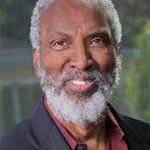
“I’m sure many of us are anxiously monitoring the tallies of yesterday’s vote and trying to make sense of what’s happening. It is, of course, too early to know the outcomes, at this point, and I find it deeply problematic that Trump could declare victory while votes are still being counted, but that shouldn’t have come as a surprise. Things are far from over, but the one thing that is clear is no matter what happens, our country needs to find a path forward so we can really heal. The day after the election shouldn’t be about who won and who lost. It should be about how we pull together and move forward, instead of pulling apart.”
Lawrence Rosenthal, chair of the Center for Right-Wing Studies
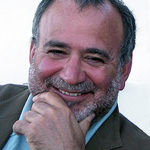
“OK, if Biden wins Nevada, Michigan and Arizona, he gets to 270—never mind the chaos that Donald Trump has been promising us for months in the courts and on the streets. But the morning after is an intellectual debacle for Blue America. Notwithstanding 2016, FiveThirtyEight (we really weren’t that wrong about Hillary & Trump) once again had its election preview—Biden at 90% —spiking dreams of a Wave election across Blue America. The ever-sober British Economist had Biden at 97%! (And 356 Electoral votes.) The estimable Marcos Moulitsas of the DailyKos assured us the Blues were the reality-based community—needing only to steel ourselves against skepticism of the polls. And don’t get me started on the certainties of the likes of James Carville on MSNBC. But maybe we hadn’t noticed that reality had moved on from 2016. Here’s my own morning-after mea culpa: 2016 and 2018 were negative partisanship elections: the right despised Hillary and came out in droves to vote against her in ’16; two years of Trump in the White House & Blue America came out in Wave numbers in 2018. I stayed with negative partisanship to explain what was coming in 2020: Two more years and it was going to be 2018 on steroids. But no—yesterday Red America was less voting against Biden than for a leader, Trump, they had fallen in love with. Sure, resentment of the liberal world was still intact. But there has been a cathexis to Trumpism and, as Trump’s increased numbers show us, that constituency has grown. There’s a new reality.”
Adrian Aguilera, associate professor of social welfare

“Election results, thus far, show the country is divided on key issues such as the pandemic, race relations, policing, etc. With final results not clear, Joe Biden appears to be in a position to win. However, Donald Trump received increased support from ethnic and racial minorities. This is surprising given his heated rhetoric regarding immigrants and Black Lives Matter. There are many possibilities for these increases in support. One key element at play is the diversity in the Latinx electorate. In Florida and other places, Cuban and Venezuelan Americans were convinced by socialist attacks on Democrats. Whereas, Mexican Americans who have been more direct targets of Trump’s rhetoric make up a larger proportion in the Southwest, likely helping turn Arizona blue. Black and Latinx voters have also been most impacted by the coronavirus pandemic, both in lost jobs and lost lives. Many are essential workers and struggle to see a way forward. Some may see the path as emphasizing the protection of lives, whereas others see protection of well-being and jobs as more important. Ultimately, we need to protect lives in order to allow the economy to be healthy, as well. The next government will need to find ways to unite the populace.”
Dan Kammen, professor of public policy and of energy and resources

“After everyone exhales, steps back, and looks at the 2020 election results, a few themes emerge: First and foremost, the Biden-Harris victory is historic: The largest number of votes for any President in history, and despite the current drama, results that are largely in line with many of the central predictions. Biden has 270 Electoral Votes if the Arizona and Nevada margins hold, and a 3 million vote lead over Donald Trump. More if Pennsylvania or Georgia swing democratic over the coming days. The really interesting questions come in the mandate and opportunities to govern with (more slim than expected) control of the House of Representatives, but likely a minority in the Senate. The exciting answer is there are many very meaningful big steps and opportunities. First, we have a President and Vice-President who listen to and benefit from … gasp … science. Second, social justice is on the agenda after four dark and divisive years. Executive orders, federal procurement, clean vehicle standards, affordable transit-smart housing, climate and racial justice legislation, dramatic job-growth opportunities, rejoining the Paris Climate Accord, are just a few of the things that are now possible. A focus on the minimum wage would be a great place to add in employment and justice to efforts akin to a civilian conservation corps. Stimulus packages, which the nation needs as part of COVID-19 recovery are a great place to start, and one area that does require legislative approval, generally appeal across the political spectrum. Americans clearly live in a house divided, but the economic and social justice fundamentals are strongly on the side of a clean energy economy. Now we have an administration ready and very well equipped to lead that charge.”
Catherine Ceniza Choy, professor of ethnic studies

“Like many Americans, I woke up on this morning of Nov. 4 feeling anxious about the uncertain outcome of the presidential race. The closeness of this election signals a brokenness — not solely in American politics, but also its soul and spirit. Our American horror story continues to unfold before a pandemic that is filling hospital beds across the country, a climate crisis that warns us with orange skies, overt forms of racial violence and xenophobia that compel me to speak out for the humanity of immigrants and people of color every chance I get and a downward economic spiral for most of the American people. Yet, I write this reaction because the closeness of this presidential race also confirms that I am not alone. Furthermore, this election is not solely a reflection of the deep political divides, but also a long U.S. history of voter suppression. Donald Trump’s claim to victory in the wee hours of this morning is premature. Half a dozen swing states are too close to call, and every vote counts.”
Steven Hayward, Berkeley Law lecturer and Institute of Governmental Studies scholar

“As of this writing, the winner of the presidential race is unclear, though Biden seems to have a slight edge for a bare Electoral College majority. But several observations are possible now. First, there has once again been considerable polling error. The phenomenon of the ‘shy Trump voter’ fits a pattern seen in several elections over the last few years, including Brexit, and the last national elections in Britain and Australia, where polls also badly underestimated center-right and ‘populist’ voting patterns. Why is this happening so consistently? Second, Trump appears on course to win the highest GOP share of non-white voters since 1960. Maybe Democrats will want to rethink their embrace of identity politics? The results of California’s Proposition 16, whose ‘No’ vote ran 20 points ahead of Trump’s vote in California, ought to suggest the new ‘diversity’ orthodoxy is not widely popular. Third, it seems reasonable to think that absent COVID, Trump might have been re-elected easily. The converse problem for Republicans is that Trump’s repellant personality may be a leading reason for his likely defeat, and that emulating ‘Trump style’ is not a winning long-term formula. Finally, while winning is always better than losing, if Biden hangs on with a GOP Senate and surprise GOP House gains, it will be the most unsatisfying presidential victory in history. Between Democratic Party infighting over its poor down-ballot showing and the likelihood that a President Biden could only serve one term, it looks like a frustrating time ahead, especially for progressive Democrats.”
Nikki Jones, professor of African American studies and African Diaspora studies

“The election results so far provide a picture of America that should put to bed for good the common refrain of ‘This is not who we are.’ This is who we are. There’s a benefit to acknowledging and accepting that reality, especially for white Americans who were moved by the events of Summer 2020. The opportunity of the moment is to discard the dream of what America is and to confront the reality. Many Black people have already done so — we’ve had to. That understanding is reflected in the voting patterns of Black people. Our knowledge of history tells us this: Confronting the reality of who we are provides a better understanding of the moment and will help to chart the battles ahead more clearly. The resistance to embracing the reality of what America is is informed, I think, by a fear of the pain that accompanies acknowledging that reality. There is pain there, but it is not the pain that determines our lives. We can hold that pain and be in the struggle and still be motivated by and surrounded by love, joy, beauty, brilliance and creativity. The evidence of that is all around us even now, especially now.”
John Swartzberg, professor of infectious diseases and vaccinology at the School of Public Health

“This election has demonstrated that nearly half of U.S. voters believe that Donald Trump deserves another four years as president. It certainly cannot be because they believe he has handled the COVID-19 pandemic well. We represent just over 4% of the world’s population, yet we have about 20% of the world’s cases and 19% of the world’s deaths. Our neighbor directly to the north, Canada, over the same period of time, has experienced on a per capita basis almost a twentieth the number of cases. Why has the United States done so poorly? Donald Trump is psychologically and intellectually incapable of guiding America through this pandemic. He is directly responsible for acting too late. Looking at the cumulative deaths between late February and early May, if social distancing had been advocated one week earlier, we would have had one-third the number of deaths. His confusing, inconsistent, and prevaricated messaging on public health issues has led to a nation confused and often hostile to such simple things as social distancing and wearing a mask. During the great influenza pandemic of 1918-19, President Woodrow Wilson never mentioned influenza (about 650,000 Americans died from this disease over 12 months). While this was reprehensible, America would be handling COVID-19 much better today if Trump would have followed Wilson’s strategy. Trump has politicized critical agencies such as the CDC, FDA, and OSHA as well as evidence-based decision-making. This has led to inadequate handling of logistics such as diagnostic testing and personal protective equipment; and pushing states to reopen prematurely. On June 1, 2020, we were averaging about 20,000 new cases; today we’re approaching 100,000 cases per day. Trump says we’re turning a corner—I see him leading us off a cliff.”
Wayne Getz, professor of environmental science, policy and management

“It appears that Biden has squeaked an Electoral College victory, but I am puzzled that he did not utterly trounce a narcissistic, wannabe fascist. So, what am I missing? Is our educational system failing to impart the lessons of history or teach students how to identify propaganda? Or does it lie in a Constitution conceived in a time of candles and carts. What can we now do to ensure that Trump and his cadre of enablers never again subject us to a reign of shame? Modernization of our Constitution has become a necessity. Changes should include abolishing the Electoral College system and letting the people’s voice prevail. Reducing rancor of a Supreme Court split along party lines should be another priority. Imposing 18-year term limits by allowing each sitting president to appoint one new Supreme Court Judge every two years, with the longest serving judge stepping down, would likely help. We also need to break the two-party hold on Congress to allow for a greater diversity of voices. One way is to have multi-seat congressional districts with a preference voting system. Only grassroots movements can ultimately overcome the resistance that current incumbents are likely to have on needed change.”
Denise Herd, associate professor of public health and associate director of diversity and health disparities at the Othering and Belonging Institute
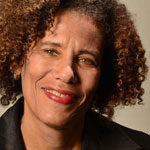
“The rise of Black Lives Matter in the wake of the murders of George Floyd and Breanna Taylor this past summer brought hope as millions of people protested brutal police killings and talked about a new antiracist vision of America. Seeing the election results was a shocking reminder that we have a long way to go as a country to achieve the new reckoning about race that earlier protests and support of BLM promised. The final months and weeks of President Trump’s campaign were squarely targeted at promoting a white supremacist view of America through denying the country’s history of racism and oppression of BIPOC and prohibiting the teaching of diversity and anti-racism. Given the election results, these sentiments resonated with the views held by many people across the country. This is truly disheartening and reflects a pattern seen over and over again where many Americans vote against their own interests to live in a safer and more just society to keep the false dream of White Supremacy alive. To take a single public example of this idea, protecting racial oppression has come at the cost of perpetuating a raging pandemic that is sickening and killing countless Americans especially BIPOC, the elderly, essential workers and health care providers; as well as draining the economy and compromising the livelihoods and life chances of millions of Americans. Whoever is elected will have the job of helping to bring an end to the virulent damage associated with White Supremacy because our future as a nation depends on it.”
Michael Mark Cohen, professor of African American studies and African Diaspora studies

“As of Wednesday morning, America is deep in its political feelings. Much of this is shaped by uncertainty as to the results of the presidential race. But on a deeper level, no matter who ends up winning as all the votes are still being counted, millions of Americans are gripped not by shock (that was 2016) but by a deep, knowing sadness this nation failed to repudiate Trump and his explicitly divisive, authoritarian and racist regime. It is evident by now that the mandate on behalf of a future multiracial democracy did not appear. Rather, we are faced with a narrow election that is, as of this moment, all but certain to generate chaos in the short term, while in the long term perpetuating the partisan gridlock that continues to fail the people of this nation. And while our feelings about this election will continue to evolve, three things remain all too clear: First, the Constitutional system that empowers minority rule through the senate, the electoral college, the Supreme Court, the filibuster, partisan gerrymandering and voter disenfranchisement, will continue to fail the American people while governing over the breakdown of our democracy and our steep decline as a nation. Secondly, that ‘whiteness’ and white identity politics remains the essential feature, identity and ideology shaping U.S. politics. And thirdly, that a Democratic party currently ruled by the old and the rich, needs to invest in young people, it needs to take their issues seriously and turn the demands of youth into a powerful and compelling platform to transform this nation in the future. No matter who wins, the next four years will be bleak. Or maybe I’m just all in my feelings right now.”
Don Moore, professor of management in the Haas School of Business

“Heading into the election, the campaigns attempted to walk a confidence tightrope, expressing enough confidence to give their supporters hope of victory, but not so much that they thought victory was assured. Now, after the election, that tightrope walk continues. All of us grapple with managing our feelings about the outcome. We yearn for evidence suggesting that our candidate will be victorious, but worry about false hope that will end in disappointment. What is the right balance? Believe the truth. That truth includes honestly facing election results, even when they take some time to arrive and even when they may contradict our personal preferences. Attempts to subvert the results, or to prevent states from counting all ballots, threaten to undermine our democracy, and all of us should be outraged by such naked attempts to manipulate the results of the election. There is a great deal of room for smart people to disagree about wise policy, but not about democratic participation. Every vote should count.”
Travis Bristol, assistant professor in the Graduate School of Education
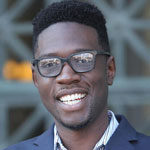
“My biggest takeaway is that we are a nation divided, not united. And it will be crucial for the next president (Joe Biden?) to find a way to unite us. As a researcher who lives in the Berkeley bubble, I feel like my challenge is to understand how slightly less than half of the population would vote for Donald Trump, as he seems to have taken us a step backward from forming a more perfect union. To me, that is astounding, and it’s astounding because I live in the Berkeley bubble. I think it would be really important to challenge myself to get some understanding around how rural America lives. It will be really important to understand the experiences of white people living outside of the urban center. I don’t think I can do that if I stay within this bubble. So, I’m thinking about what kinds of partnerships I might need to create with school districts serving rural areas, rural children and rural families. That will help me in my research to understand how is it that after four years of this president, people are still voting for him.”
Keith Gilless, dean and professor emeritus of forest economics

“As I wait for the final results, I am hopeful for a return to federal rule-making on critical issues like climate change, endangered species protection or forest and wildfire management that puts science before political expediency, and for less politicized decision making on environmental and social issues that range from the standing of Native Americans to participate in co-management arrangements with federal agencies on their traditional homelands to how we provide federal assistance to communities affected by natural hazards.”
Jennifer Chatman, professor of management in the Haas School of Business

“Before he died, my father, Seymour Chatman — the ‘original’ professor Chatman at UC Berkeley — wrote a letter to his granddaughters. He said, ‘Surround yourself with people who love you. Find work you are passionate about. And never vote Republican.’ The last piece of advice was, I think, less of a political statement and more a reflection of our family’s values: cherish the natural world, honor science, treat others with respect and compassion. With the election still hanging in the balance, I woke up this morning asking myself, ‘How can it even be close?’ I feel great sadness for our country, which has favored — and may continue to favor — lies over truth, short-term convenience over scientific realities and bullying and division over unity and understanding. These preferences are hard to reckon with. We face the prospect of being led, for another four years, by a deeply narcissistic man who dispenses with people like autumn leaves dropping, who engages with the awesome job of president with no apparent curiosity or capacity to learn and who builds himself up by putting others down. My research suggests that this won’t end well — narcissistic leaders leave chaos in their wake. No matter the outcome, I worry for our country.”
Ron Amundson, professor of environmental science, policy and management

“After the 2016 election, there was a flurry of emails among campus faculty expressing shock over the election results and a sense of surprise that reason did not prevail among the public. As I sat through the early results last evening, I imagine the sentiment was the same. While I find ‘elitist’ an uncomfortable term to describe my colleagues and myself, a refugee from a South Dakota farm, we are viewed as such by a large portion of the electorate. We are partially to blame for this situation. The university must adopt tools of cognitive science to establish dialogue and common ground with people and communities outside our ever louder academic echo chamber. A lesson from cultural cognition research is that amplifying a given tribal voice, however well-intended, is part of our societal problem, not a solution. If Biden wins, it will be an affirmation of the importance of affirmation and narrative framing with people outside our immediate cultural tribe. However, the narrowness of this electoral success illustrates how difficult this societal reconnection will be. The path toward unity cannot be restricted to a ‘conversation’ within the walls of the university. It must involve challenging changes in how we participate and act as citizens in the messy institution called democracy.”
Robert Levenson, professor of psychology
 “The human nervous system is exquisitely designed to scan sensory input constantly for changing conditions, calculate safety and danger, ready the body for appropriate action and encase the entire process in a wrapper of emotional feelings. Typically, this happens quickly and definitively, nudging us toward behaviors that are most likely to deal successfully with current challenges and opportunities and allowing us to attend to other pressing details of our lives. For those of us who care deeply about the outcome of this election, the current period of uncertainty is an unwanted emotional gift that keeps on giving. We find ourselves obsessively processing and reprocessing the available information, calculating and recalculating safety and danger based on every new jiggle on the ever-changing graphics of election returns and riding a roller coaster of shifting emotional experiences that include fear, anger, disgust, surprise, sadness and (hopefully) joy. In this state of emotional liability created by uncertainty, we sometimes first experience arousing thoughts that lead to powerful bodily reactions and sometimes experience those bodily reactions first and only then become aware of our thoughts and emotional feelings. The interplay of these ‘top-down’ and ‘bottom-up’ directions of emotional activation happening across the full spectrum of emotions can be jarring, unsettling, disruptive and, ultimately, exhausting. In these times of extraordinary division, where it is easy to see those on other parts of the political spectrum as so completely different, there may be some comfort in knowing that we are all sailing along in similarly turbulent emotional seas.”
“The human nervous system is exquisitely designed to scan sensory input constantly for changing conditions, calculate safety and danger, ready the body for appropriate action and encase the entire process in a wrapper of emotional feelings. Typically, this happens quickly and definitively, nudging us toward behaviors that are most likely to deal successfully with current challenges and opportunities and allowing us to attend to other pressing details of our lives. For those of us who care deeply about the outcome of this election, the current period of uncertainty is an unwanted emotional gift that keeps on giving. We find ourselves obsessively processing and reprocessing the available information, calculating and recalculating safety and danger based on every new jiggle on the ever-changing graphics of election returns and riding a roller coaster of shifting emotional experiences that include fear, anger, disgust, surprise, sadness and (hopefully) joy. In this state of emotional liability created by uncertainty, we sometimes first experience arousing thoughts that lead to powerful bodily reactions and sometimes experience those bodily reactions first and only then become aware of our thoughts and emotional feelings. The interplay of these ‘top-down’ and ‘bottom-up’ directions of emotional activation happening across the full spectrum of emotions can be jarring, unsettling, disruptive and, ultimately, exhausting. In these times of extraordinary division, where it is easy to see those on other parts of the political spectrum as so completely different, there may be some comfort in knowing that we are all sailing along in similarly turbulent emotional seas.”
